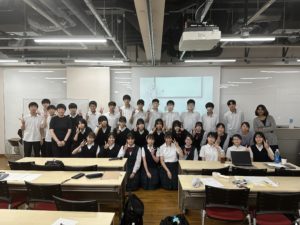2023.Oct.16
REPORTSReport on B’AI Global Forum Lecture Entitled “Artificial Intelligence and Society” for Sapporo Daiichi High School Students
Priya Mu (Research Assistant, B’AI Global Forum)
・Date: Saturday, September 30, 2023, 13:00-15:00
・Venue: Room 92B, Engineering Building 2 (The University of Tokyo, Hongo Campus)
・Language: Japanese

On September 30, 2023, the B’AI Global Forum welcomed 35 first and second-year students from Sapporo Daiichi High School to offer a lecture on “Artificial Intelligence and Society.” The lecture was led by Professor Yuko Itatsu, the director of the B’AI Global Forum, the team also included research assistants Nozomi Ohtsuki and Priya Mu. Each presenter connected their expertise with AI, offering insights on various issues and social challenges to the students.
The session started with Ohtsuki presenting on “Digital Archives and AI,” discussing the collection of materials in museums and digital archives, as well as the use of AI in this process, providing insights into the benefits of using AI in material collection and preservation. Following Ohtsuki, Mu gave a presentation on “Architecture and AI,” discussing how AI and machine learning technologies can be used to make the design process more inclusive and democratic. Professor Itatsu provided a lecture on “AI and Society,” covering its potential and challenges with vivid examples, such as biased face recognition and the consequences of the recidivism algorithm. The lecture also discussed societal biases in AI design and the performance and attitudes towards AI in Japan.
The discussion session covered several key topics related to AI’s impact on society. Firstly, there was a question about the role of human teachers in nurturing individuals, suggesting a preference for human educators over AI, even as automation becomes more prevalent. The second topic delved into the portrayal of AI and humans coexisting in anime and manga, pondering the possibility of a society where AIs comprehend human emotions. The term “Singularity” was mentioned, likely referring to a point of technological advancement beyond human comprehension. Lastly, the discussion raised concerns about the potential displacement of jobs based on meritocracy and achievement due to AI, prompting a consideration of how to support individuals who may no longer have clearly defined roles.
In conclusion, this lecture aimed to empower the students, who will play a pivotal role in shaping the future of an AI-driven society, by prompting them to reflect on the profound societal and ethical dilemmas posed by this transformative technology.